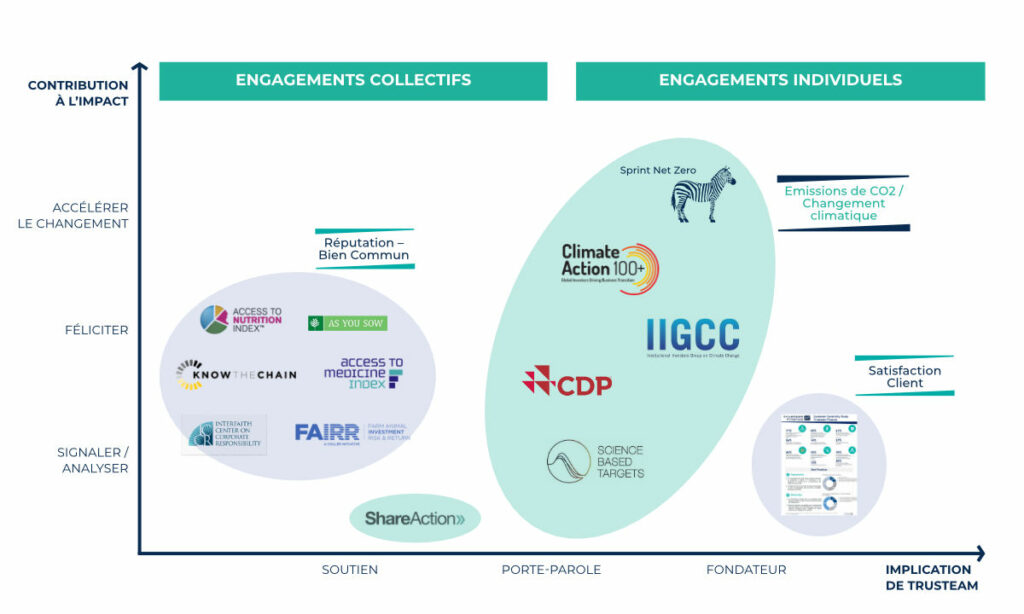
Customer Satisfaction and Socially Responsible Investment —
According to multiple academic studies, we discovered that Customer satisfaction is THE criterion that links financial and non-financial performance. An investment based on customer satisfaction gives purpose to savings and fits the definition of a Socially Responsible Investment (SRI) as integrating ESG criteria:
– Environmental: Clients have realized that we have only one planet. Customer-centric companies understand this also well: they respect the planet while offering concrete solutions to clients for reducing their impact on the environment.
– Social: Employee engagement is the link between the product and the customer. For clients to be satisfied, employees need to be motivated, trained, and engaged. This is the principle of the Symmetry of Intentions © (source : www.symetriedesattentions.com)
– Governance: A company focused on the customer must have exemplary behaviors, not only to minimize reputation risks but also to create a climate of trust where all employees are aligned toward a common mission: satisfying the customer.
Our ROC (Return On Customer) investment process fully integrates all ESG aspects. It is based on academic research demonstrating the close link between a high customer satisfaction rate and the increased profitability of the company, its financial performance, and its stock market trajectory.
Beyond the Social criterion of Customer Satisfaction, our approach takes into account qualitative criteria of Environment and Governance. For each theme, the goal is not only to minimize non-financial risks but above all to provide solutions that meet clients’ needs.
Against Climate Change: the Power to Be Active! —
The latest report from the IPCC (Intergovernmental Panel on Climate Change) leaves little room for doubt: “human influence contributes to numerous observed changes in extreme weather and climate conditions.”
This finding is alarming, but it is not inevitable. Faced with this danger, we can still act. How? The keyword is « Net Zero 2050 »1 . According to the IPCC report, “achieving cumulative net zero CO2 emissions produced by humans is imperative to stabilize the global temperature increase.”2
Everyone’s involvement is essential. “Doing our part” is important, but to become globally “Net Zero,” we need to scale up.
The French perceive this well: concerned about the environment at 78%, they think that it is primarily up to companies, more than themselves, to act.3 And they are not wrong. The total carbon footprint of French households represents only about 2% of total global emissions, while the 167 companies targeted by Climate Action 100+ are responsible for 80% of these emissions!4
To maximize the impact of our actions, we need to succeed in changing the practices of these companies, pushing those responsible for the majority of CO2 emissions in the world to commit to carbon neutrality. And to achieve this, there is a powerful lever still underutilized but that can have a considerable effect: our savings.
Some studies show that acting through savings, by replacing traditional funds with “responsible” funds, can have between 21 and 27 times5 more impact to reduce carbon footprint than eating less meat, using public transportation, using less water, or flying less.
—
1For more information, please check the replay of the Sprint Net Zero 3rd season launching
2IPCC, 2021, Climate Change 2021: The Physical Science Basis. Contribution of Working Group I to the Sixth Assessment Report of the Intergovernmental Panel on Climate Change
3Corporate Engagement Barometer, Trusteam / Obsoco 2021
4 As of 06/30/2023 – details available in report 29 LEC
5 In the UK campaign by makemymoneymatter.co.uk/21x/ and in Sweden, Nordea study, 2021.
A Rigorous Exclusion Policy —
For over 10 years, at Trusteam, we have built a management strategy centered on a non-financial criterion: Customer Satisfaction. This selective and demanding approach led us not to invest in many sectors that are among the most risky from a sustainability perspective.
Why? Because these sectors, such as those related to fossil fuels or mining, are not covered by our “Customer” approach. These business sectors do not correspond to our skills and the investment philosophy we wanted to offer our clients. To these historical reasons are added growing non-financial risks related to these sectors. This document aims to structure and make this exclusion and consideration of non-financial risks approach more transparent. Certain activities, exposed in our sustainability risk management policy, present too many risks for us to make a management decision given our expertise. In these sectors, we practice exclusion.
This principle is applied in two ways:
– At the macro level: where our expertise does not apply, but there are significant risks related to planetary/social limits. We then exclude companies belonging to certain sectors that seem very risky to us and/or that may cause harm to a planetary/social limit when we do not have the necessary expertise to pass judgment.
– At the micro level: where we have expertise and can analyze companies through the robustness of their customer asset. We eliminate companies with too low a ROC score, i.e., whose customer asset does not seem strong enough to resist or guard against the most material non-financial risks for the company.1
Our exclusions include:
– Fossil fuels
– Companies involved in deforestation
– Controversial and conventional weapons
– Adult entertainment
– Tobacco
—
For more details: detailed document on our policy.
1More details on the ROC methodology in the transparency code.
Shareholder Engagement —
Shareholder engagement is a fundamental principle of Trusteam Finance’s investment policy: to change practices, both in terms of customer culture and decarbonization of the economy. We use engagement as an extension of our analysis and a means to better understand companies.
At Trusteam Finance, engagement consists of:
– Raising awareness of the importance of customer satisfaction.
– Taking a stand on ESG issues, to better understand what companies are doing and asking them to improve their practices in the long term.
– To do this, the allocated resources are proportional to the materiality of the issue.
Engagements related to criteria:
– Customer experience and Net Zero commitment are the subject of direct and individual engagement.
– Reputation is the subject of collective engagements where Trusteam Finance can be more or less active depending on its level of competence and interest.
– General interests are the subject of more general statements of intent.
Our Commitments in Numbers
Fossil energy
since 2021
25 times
less
Carbon-intensive funds
than their benchmark indices1
of assets
labeled ISR2
Companies with which we conduct shareholder engagement dialogues3
on the path to Net Zero
of votes at AGMs
of portfolio companies
1 As of 06/30/2023 – details available in report 29 LEC
2 As of 12/31/2022 – Before merging with Gaspal Gestion
3 As of 12/31/2022 – details available in the voting and engagement report
Downloadable documents —
— Code de transparence ISR
— Rapport article 29 LEC
— Politique de vote et d’engagement
— Politique sur la prise en compte des risques de durabilité
— Rapport sur la mesure de la performance ESG pour les fonds actions, fonds obligataires et fonds diversifiés
— Rapport de vote et d’engagement actionnarial
— UN PRI Public Transparency Report
— UN PRI Assessment report
